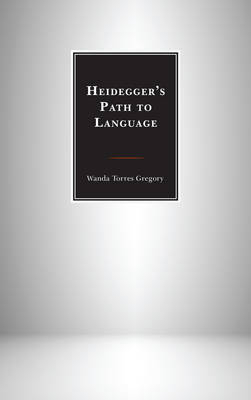
Heidegger's Path to Language
Seiten
2016
Lexington Books (Verlag)
978-1-4985-2702-6 (ISBN)
Lexington Books (Verlag)
978-1-4985-2702-6 (ISBN)
This book analyzes and compares the different concepts that Heidegger developed about language over his career, reflects critically on his idea of the mysterious language of Er-eignis, and offers an alternative model of the appropriating force of language.
With the recent publication of works from Heidegger’s Collected Edition, it has become evident that language occupied a central place in his thought “from early on,” as he claimed in his later years. Heidegger’s Path to Language takes on the timely task of guiding us through the development of his reflections on language from his younger years as a doctoral student to the later period of being-historical thinking. Wanda Torres Gregory argues that Heidegger continually pursued the question concerning the essence of language in what he later called his “background” discussions. She proposes that the clue lies in his often implicit use of Aristotle’s definition of logos—in terms of apophansis, synthesis, and phone—as the guideword for his thoughts on language. Torres Gregory uncovers three different stages of this buried path of logos that she correlates with his key philosophical principles at each step: the ideal of a pure logic, the existential analytic in the project of fundamental ontology, and the meditations on the appropriating-event. Her analysis of the constants and changes in Heidegger’s way to language via logos continues with a systematic comparison of his different answers to age-old philosophical problems concerning how language relates to reality, thought, meaning, and truth. Torres Gregory concludes with a critique that unveils the later Heidegger’s dogmas and inconsistencies and challenges his concept of the mysterious language of Er-eignis with an alternative (bio-linguistic) model of its appropriating force.
Heidegger’s Path to Language contributes to the scholarship in Heidegger, continental philosophy, philosophy of language, comparative literature, German studies, and linguistics. It is intended primarily for specialists in those fields and will thus be of interest mainly to college professors and graduate students.
With the recent publication of works from Heidegger’s Collected Edition, it has become evident that language occupied a central place in his thought “from early on,” as he claimed in his later years. Heidegger’s Path to Language takes on the timely task of guiding us through the development of his reflections on language from his younger years as a doctoral student to the later period of being-historical thinking. Wanda Torres Gregory argues that Heidegger continually pursued the question concerning the essence of language in what he later called his “background” discussions. She proposes that the clue lies in his often implicit use of Aristotle’s definition of logos—in terms of apophansis, synthesis, and phone—as the guideword for his thoughts on language. Torres Gregory uncovers three different stages of this buried path of logos that she correlates with his key philosophical principles at each step: the ideal of a pure logic, the existential analytic in the project of fundamental ontology, and the meditations on the appropriating-event. Her analysis of the constants and changes in Heidegger’s way to language via logos continues with a systematic comparison of his different answers to age-old philosophical problems concerning how language relates to reality, thought, meaning, and truth. Torres Gregory concludes with a critique that unveils the later Heidegger’s dogmas and inconsistencies and challenges his concept of the mysterious language of Er-eignis with an alternative (bio-linguistic) model of its appropriating force.
Heidegger’s Path to Language contributes to the scholarship in Heidegger, continental philosophy, philosophy of language, comparative literature, German studies, and linguistics. It is intended primarily for specialists in those fields and will thus be of interest mainly to college professors and graduate students.
Wanda Torres Gregory is professor and chair of philosophy at Simmons College.
Introduction: The Question Concerning Language
Part One: Steps in the Path of Logos
Chapter One: Interpreting Logos
Chapter Two: The Pure Logos: 1912-1916
Chapter Three: The Living Logos: 1919-1933
Chapter Four: The Appropriating Logos: 1934-1972
Part Two: Constants and Changes of Language as Phōnē
Chapter Five: Means and Realms
Chapter Six: Linguistic Structures
Chapter Seven: Semantics
Chapter Eight: Truth and Language
Conclusion: Problems Underway to the Essence of Language
The Problem of Wesen
The Problem of Sprache
Toward an Alternative Model of Sprache
| Erscheinungsdatum | 25.08.2016 |
|---|---|
| Verlagsort | Lanham, MD |
| Sprache | englisch |
| Maße | 160 x 235 mm |
| Gewicht | 426 g |
| Themenwelt | Geisteswissenschaften ► Philosophie ► Erkenntnistheorie / Wissenschaftstheorie |
| Geisteswissenschaften ► Philosophie ► Sprachphilosophie | |
| ISBN-10 | 1-4985-2702-7 / 1498527027 |
| ISBN-13 | 978-1-4985-2702-6 / 9781498527026 |
| Zustand | Neuware |
| Haben Sie eine Frage zum Produkt? |
Mehr entdecken
aus dem Bereich
aus dem Bereich
die Grundlegung der modernen Philosophie
Buch | Softcover (2023)
C.H.Beck (Verlag)
18,00 €
Buch | Softcover (2023)
Reclam, Philipp (Verlag)
7,00 €

![Was heißt Denken?. Vorlesung Wintersemester 1951/52. [Was bedeutet das alles?] - Martin Heidegger](/media/113619842)
